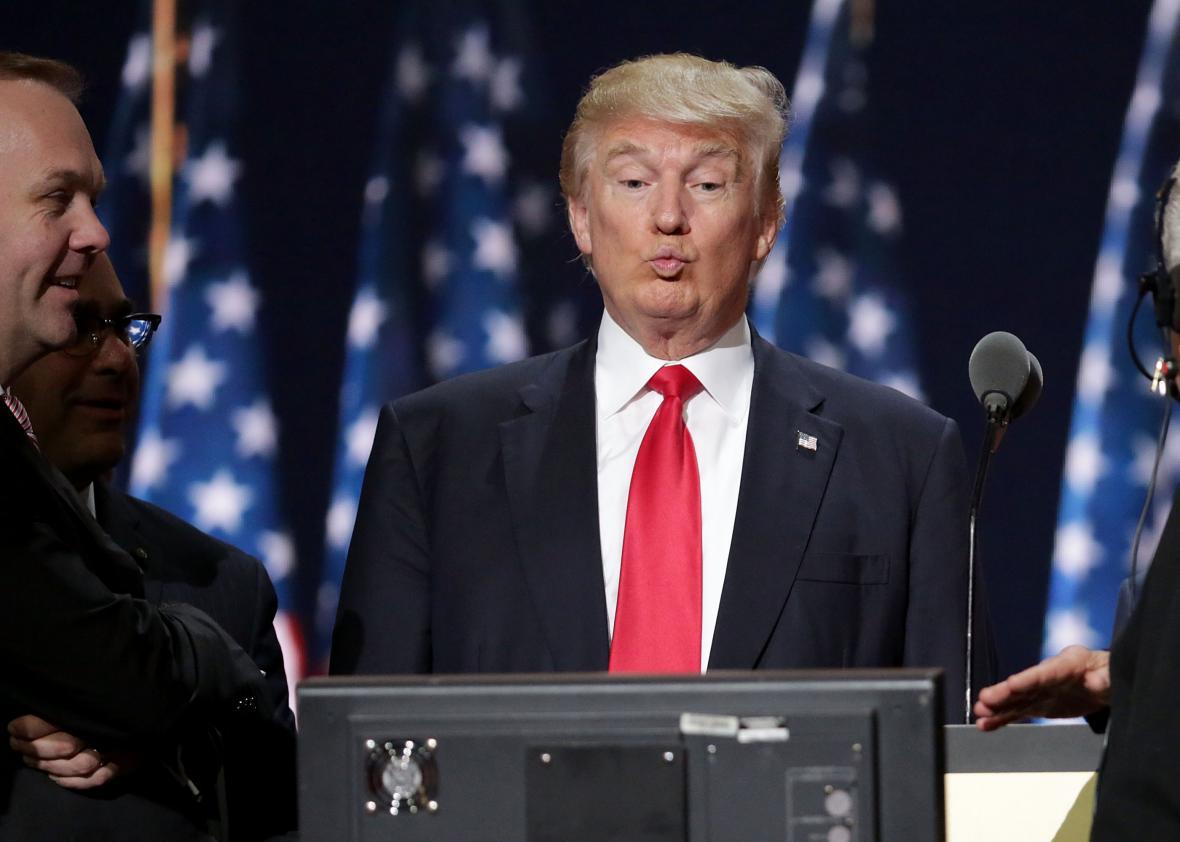Another week, another instance in which Donald Trump has offhandedly suggested that, given the opportunity, he might just lay waste to the postwar global order.
You might have missed this news, what with all the intrigue over Russian hacking and his campaign’s unabashed sympathies toward the Kremlin. But during a Sunday Meet the Press appearance, Trump floated the idea of withdrawing from the World Trade Organization if it tried to prevent him from taxing U.S. companies that move their manufacturing abroad. Here’s the exchange:
Chuck Todd: What kind of tax are you thinking?
Donald Trump: It could be 25 percent. It could be 35 percent. It could be 15 percent. I haven’t determined. And it could be different for different companies. [Rambles semi-coherently for a while.]
Chuck Todd: Well, some of these things aren’t going to get through the World Trade Organization. There’s—
Donald Trump: It doesn’t matter. Then we’re going to renegotiate or we’re going to pull out. These trade deals are a disaster, Chuck. World Trade Organization is a disaster.
This is one of the more destructive things Trump has blurted out during his spirit-crushing intellectual train wreck of a campaign. As others have noted, it’s roughly the trade equivalent of the time he said he might abandon our NATO allies. I dare say it might be the second dumbest economic idea Trump has raised yet, behind that time he hinted he might default on America’s national debt. (Nothing is going to top that one, even if he sort of walked it back.)
The World Trade Organization is the international body that has structured global commerce since its inception in 1995. It’s loathed by the left—and now the reactionary right—who tend to see it as a tool of global corporate interests. But the bottom line is it sets the basic trade rules among 163 different nations—from the U.S. to China all the way down to Vanuatu—and enforces them through its judicial branch. The system allows countries to settle disputes without risking an escalating battle of tit-for-tat tariffs or, you know, actual war. (Of course, members can still negotiate bilateral or multilateral trade deals like NAFTA or the TPP on the side.) And bailing on it would massively destabilize the institutional underpinnings of the entire world economy, which were painstakingly built over decades. (The WTO evolved out of the General Agreement on Tariffs and Trade, signed in 1947.)
You can argue about the WTO’s sins and virtues; there are indeed some who think we might be better off without it. But what makes Trump’s outburst so mind-numbing is that leaving the WTO would actually make it harder for the U.S. to pursue the protectionist policies he’s so eager to implement.
Yes, harder. Under WTO rules, countries are required to go through a lengthy process to settle trade battles that involve rounds of negotiation, hearings, and appeals. If President Trump were to put up, say, a massive tariff on Chinese steel, it could takes years for Beijing to successfully challenge it and win the right to retaliate with a tariff of its own. If the United States were not a member of the WTO, however, China could retaliate immediately, with no repercussions. Instead of enjoying a nice first-mover advantage in a trade war, the United States would be subjecting itself to a potentially disastrous free-for-all.
In other words, if you’re a protectionist like Trump, leaving the WTO is self-defeating. As Roosevelt Institute fellow Todd Tucker put it to me, the group “allows more protectionism without rapid retaliation.”
Of course, if China or Mexico or any other country really was violating international trade rules by, say, dumping cheap exports into our markets as Trump sometimes accuses them of doing, the WTO process would allow the government to put up tariffs without facing Chinese retaliation at all. The Obama administration, for instance, has won disputes over tariffs it slapped on Chinese tires. The current White House has also brought numerous cases challenging China’s own protectionist measures at the WTO. And, though it might surprise Trump, we frequently win.
Now here’s the worst thing about Trump’s completely backward threat: He might be able to make it happen. Though there’s some controversy over the matter, many believe presidents do have the legal power to pull the United States out of its trade agreements unilaterally (what they can’t do on their own is create new tariffs). “Anything he does that he’s threatened, he would be challenged in court,” said Gary Hufbauer, a trade expert at the Peterson Institute for International Economics. “My view, having read these statutes, is that he has a much better than even chance of prevailing in the courts.” So, as futile and self-destructive as this gesture might be, Trump could not only threaten it. He could probably follow through.
